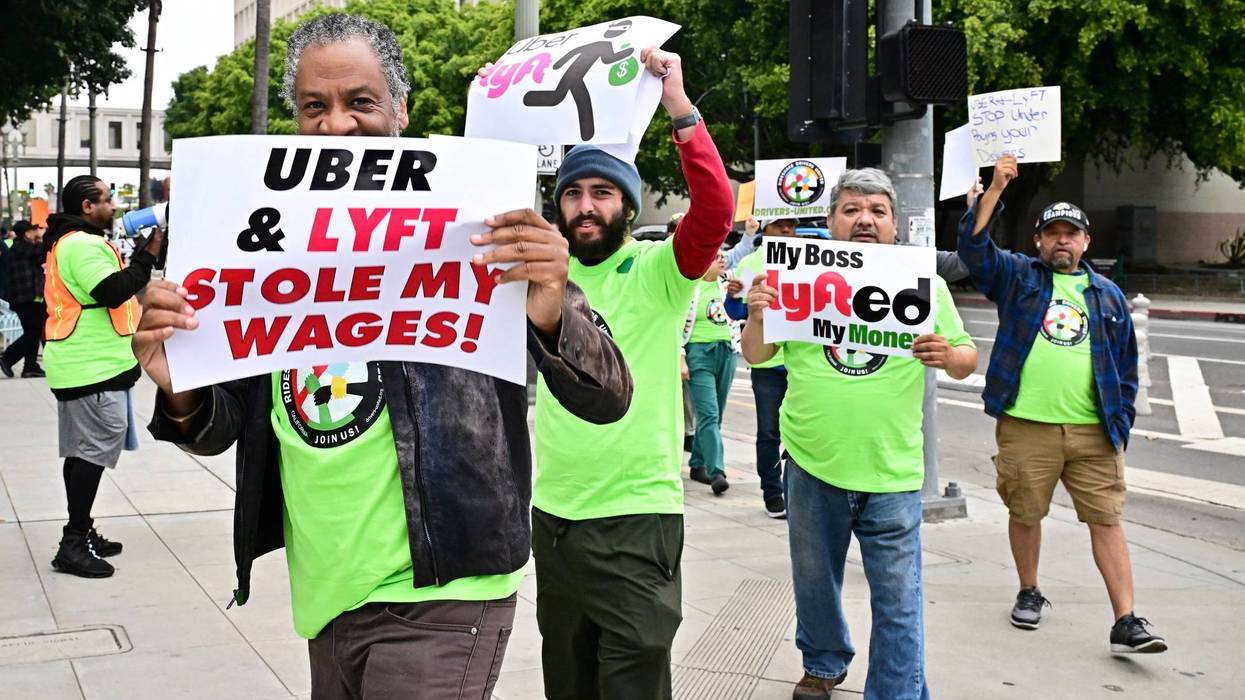August, 28 2020, 12:00am EDT

For Immediate Release
Contact:
Email:,press@civilrights.org,Phone: (202) 869-0398
WASHINGTON
In testimony before the House Administration Committee, Vanita Gupta, president and CEO of The Leadership Conference on Civil and Human Rights, will call on Congress to take steps to ensure that the U.S. Postal Service (USPS) operates at full capacity. During the ongoing COVID-19 pandemic, voters should not be forced to choose between their health and their fundamental right to vote, as occurred in many of the recent primary elections. Gupta, who previously served as the head of the U.S. Department of Justice's Civil Rights Division, will underscore that all communities, particularly those who have faced barriers to the ballot like people of color, must have their voices heard in the upcoming November election.
"The slew of recent service and operational changes at USPS threaten to have a devastating impact on communities of color that continue to bear the legacy of centuries of political and economic disenfranchisement. Further, President Trump's attacks on the integrity of both mail-in and in-person voting also pose grave danger to the administration of safe, fair, and accessible elections," said Gupta. "What we have seen to date in this year's primary elections provides a dire warning of what we could expect this November--unless election officials act now to ensure safe and accessible elections over the next 66 days."
Gupta urged Congress to require states to:
- Expand voter registration opportunities, including requiring that any eligible citizen can register to vote online and requiring that any voter be allowed to register to vote on the same day that they vote (same-day voter registration);
- Ensure that every voter can access no-excuse absentee ballots with prepaid postage in all federal elections, prohibit states from requiring notarization or witness signatures to cast an absentee ballot, and, during emergencies such as COVID-19, require states to automatically mail absentee ballots to all registered voters no later than two weeks before Election Day, require the counting of ballots postmarked on or before Election Day, reform signature matching laws to provide notice to voters of any problems with their ballot and an opportunity to address any inconsistencies;
- Provide at least 15 consecutive days of in-person early voting, with such voting being available at least 10 hours per day and at locations that are accessible by public transportation;
- Defray the costs to states of undertaking public education campaigns to educate voters about new voting and registration options in the wake of COVID-19; and
- Ensure that voters residing on Indian lands can access the ballot by maintaining robust and safe in-person voting options and providing secure ballot return drop boxes.
Gupta also urged all voters to safeguard their right to vote in these unprecedented times, with these six key steps:
- First, check your registration today and register or update your information if you need to. Voters can go to andstillivote.org/resources or contact their state election officials.
- Second, make your plan to vote. Request your absentee ballot today and return it far in advance of Election Day.
- Third, if you prefer to vote in person, make every effort possible to cast your ballot during your jurisdiction's early voting period if it is available.
- Fourth, if you are able, sign up to be a poll worker, at powerthepolls.org, to ensure that polling places are properly staffed on Election Day and that voters aren't forced to wait in excessively long lines to cast a ballot.
- Fifth, if you see misinformation on a social media platform, do not amplify it by responding; report it to the platform for removal.
- Finally, contact the nonpartisan Election Protection hotline (866-OUR-VOTE or 866ourvote.org) with any questions about voting or to report any problems with the voting process.
Read Gupta's full testimony for the record here.
The Leadership Conference on Civil and Human Rights is a coalition charged by its diverse membership of more than 200 national organizations to promote and protect the civil and human rights of all persons in the United States. Through advocacy and outreach to targeted constituencies, The Leadership Conference works toward the goal of a more open and just society - an America as good as its ideals.
(202) 466-3311LATEST NEWS
Anthropic CEO 'Cannot in Good Conscience Accede' to Pentagon's AI Demand
"Anthropic and Dario deserve credit for standing up for two very basic and obvious principles: no mass surveillance and no autonomous killer robots," said one progressive commentator.
Feb 26, 2026
Defense Secretary Pete Hegseth gave Anthropic until Friday evening to agree to let the Pentagon use the company's artificial intelligence technology however it wants, or else. Roughly 24 hours ahead of the deadline, CEO Dario Amodei announced that "we cannot in good conscience accede to their request," and reiterated opposition to enabling autonomous weapons or surveillance of US citizens.
Anthropic's Claude was the first AI model allowed to handle classified US military data. While the Department of Defense (DOD) has now signed an agreement with Elon Musk's xAI and "is getting close to making a deal with Google," as the New York Times reported Monday, Hegseth demanded "unfettered" access to Claude during a Tuesday meeting with Amodei.
Hegseth threatened to declare the Anthropic a "supply chain risk," effectively blacklisting it for military use and ending its current contract, or invoke the Defense Production Act, which would force Anthropic to tailor the product to the DOD’s needs, if Amodei refused to drop the company's guardrails.
The CEO responded publicly with a Thursday blog post. Using President Donald Trump's preferred name for the Pentagon, he wrote that "Anthropic understands that the Department of War, not private companies, makes military decisions. We have never raised objections to particular military operations nor attempted to limit use of our technology in an ad hoc manner."
"However, in a narrow set of cases, we believe AI can undermine, rather than defend, democratic values. Some uses are also simply outside the bounds of what today's technology can safely and reliably do," Amodei continued. He explained the company's position that "using these systems for mass domestic surveillance is incompatible with democratic values."
"AI-driven mass surveillance presents serious, novel risks to our fundamental liberties. To the extent that such surveillance is currently legal, this is only because the law has not yet caught up with the rapidly growing capabilities of AI," he wrote. "For example, under current law, the government can purchase detailed records of Americans' movements, web browsing, and associations from public sources without obtaining a warrant, a practice the Intelligence Community has acknowledged raises privacy concerns, and that has generated bipartisan opposition in Congress. Powerful AI makes it possible to assemble this scattered, individually innocuous data into a comprehensive picture of any person's life—automatically and at massive scale."
The CEO also argued that "frontier AI systems are simply not reliable enough to power fully autonomous weapons. We will not knowingly provide a product that puts America's warfighters and civilians at risk." He noted that Anthropic offered to work directly with the department on research and development to "improve the reliability of these systems, but they have not accepted this offer."
Amodei concluded by expressing hope that the Pentagon revises its position, writing that "our strong preference is to continue to serve the department and our warfighters—with our two requested safeguards in place. Should the department choose to offboard Anthropic, we will work to enable a smooth transition to another provider, avoiding any disruption to ongoing military planning, operations, or other critical missions."
Amodei's blog post followed CBS News reporting earlier Thursday that "Pentagon officials on Wednesday night sent Anthropic their best and final offer in negotiations for use of the company's artificial intelligence technology."
It also came just hours after Pentagon spokesperson Sean Parnell responded to a related post from a Google scientist on Musk's social media platform X. The DOD official claimed that "the Department of War has no interest in using AI to conduct mass surveillance of Americans (which is illegal) nor do we want to use AI to develop autonomous weapons that operate without human involvement. This narrative is fake and being peddled by leftists in the media."
"Here's what we're asking: Allow the Pentagon to use Anthropic's model for all lawful purposes. This is a simple, commonsense request that will prevent Anthropic from jeopardizing critical military operations and potentially putting our warfighters at risk. We will not let ANY company dictate the terms regarding how we make operational decisions," Parnell added, noting the Friday deadline and the threat to "terminate our partnership with Anthropic and deem them a supply chain risk."
While Amodei and observers await the Pentagon's next move, several Anthropic employees, other tech experts, and critics of the Trump administration praised the CEO for "standing on principle" and choosing "war with the Department of War."
"Anthropic and Dario deserve credit for standing up for two very basic and obvious principles: no mass surveillance and no autonomous killer robots," said progressive commentator Krystal Ball. "Perhaps this is a low bar but it isn’t clear any of the other leading AI companies would put principle above profits in ANY scenario. The Pentagon is sure to make Anthropic pay for daring to defy them."
Keep ReadingShow Less
Trump's Revived Anti-Worker Rules Condemned as 'Outright Grift'
"Every day, little by little, the Trump administration is rigging the system to benefit giant corporations and shortchange workers," said one senator.
Feb 26, 2026
President Donald Trump's "barrage of attacks on workers" continued on Thursday with announcements about two key labor rules.
The US Department of Labor (DOL) proposed an independent contractor rule that the National Employment Law Project (NELP) called "yet another example of the administration siding with major corporations and stacking the deck against working people" by "effectively allowing employers to strip workers of federal minimum wage and overtime protections."
The DOL's Wage and Hour Division proposal would replace the Biden administration's widely celebrated 2024 policy for when employers can treat workers as independent contractors under the Fair Labor Standards Act with business-friendly guidance that resembles a rule adopted just before the end of Trump's first term.
"This rule will have profound real-world consequences for working people," warned NELP. "Misclassification is common in many labor-intensive, poorly paid jobs—jobs like home healthcare, janitorial work, landscaping, personal services, and increasingly, app-dispatched ride-hail and delivery—where people of color and immigrants are overrepresented, and workers lack the bargaining power to negotiate higher wages and better working conditions."
NELP pointed to research showing that low-paid independent contractors "lag behind their employee counterparts," and some "do not even earn the federal minimum wage." The organization stressed that "this rule threatens to enshrine a two-tiered labor system where similarly situated workers receive vastly different rights and protections based on the classification chosen by the business employing them."
The new rule—which now faces a 60-day public comment period—focuses on two "core factors" to determine an employee's classification: the nature and degree of control over the work, and the worker's opportunity for profit or loss based on initiative or investment.
NELP argued that "by elevating two factors above other equally important factors, the Trump administration's test fails to account for the economic realities of many working relationships. Many workers labeled as independent contractors are not really in business for themselves because they are integrated into the operations of a larger business structure that sets most of the terms of the work."
"In app-dispatched ride-hail and delivery jobs, for example, corporations like Uber, Lyft, DoorDash, and Amazon use apps and algorithms to offer shifts or assignments to so-called independent contractors doing the core work of the business, set the wages these workers receive, surveil and assess their performance, and determine if they are offered future assignments or get 'deactivated,'" the group noted. "App-based ride-hail and delivery workers perform difficult and dangerous work without basic employment protections like the right to minimum wage and overtime, workers' compensation, and unemployment insurance."
As NELP and other critics sounded the alarm over the DOL proposal on Thursday, the National Labor Relations Board (NLRB) also revived an effort from Trump's first term, reinstating that administration's 2020 rule on joint employers.
During Trump's initial administration, the NLRB required joint employers to "possess and exercise substantial direct and immediate control" over at least one aspect of the workers' employment. In 2023, under former President Joe Biden, the board decided that two or more entities could be considered joint employers if they had an employment relationship with the workers and helped to determine their terms and conditions of employment. However, the latter was blocked by a Trump-appointed judge the next year.
Unlike the DOL proposal, the board's rule is final. The NLRB—which has two Trump appointees, one Biden appointee, and two vacancies—said in the Federal Register that "the 2023 rule was vacated by the district court, and the action the board takes today merely implements the court's decision. Our action is ministerial and therefore will have no separate economic effect."
US Sen. Patty Murray (D-Wash.), a senior member and former chair of the Senate Health, Education, Labor, and Pensions Committee, declared in a Thursday statement that "every day, little by little, the Trump administration is rigging the system to benefit giant corporations and shortchange workers—it's an outright grift and working people should be furious."
"The joint employer rule is nothing more than a return to Trump's anti-worker policies that let giant corporations skirt their basic obligations to employees—Trump is giving the biggest corporations cover to deny workers their ability to band together for better wages and working conditions and leaving millions of workers in the lurch, vulnerable to egregious violations of their rights," she said.
"At the same time, today, the Trump administration announced they're working to rescind the independent contractor rule," Murray continued. "Trump wants to let giant corporations classify workers as contractors so that they don't have to pay them minimum wage and overtime—these workers deserve fair pay."
The senator then took aim at the so-called One Big Beautiful Bill Act that congressional Republicans passed and the president signed last summer, saying that "under the Trump administration, giant corporations get giant tax breaks paid for by cutting Medicaid—the healthcare that the poorest workers are forced to rely on."
"Now, Trump wants those same corporations off the hook for every benefit, protection, and dollar they'd otherwise owe to millions of workers—it's a shakedown," she asserted. "Republicans are proving time and again, they don't care about workers—they don't want to even let workers have crumbs, but billionaires can get trillions in tax breaks that will blow up our national debt."
Murray isn't up for reelection in November's closely watched midterms, but could lead the Senate Appropriations Committee if Democrats reclaim the chamber. On Thursday, she vowed that "I am going to keep fighting for laws on the books that protect workers and build an economy that grows the middle-class, not just profit margins for the largest corporations on Earth."
Keep ReadingShow Less
Israel Responsible for Two-Thirds of Journalist Deaths in 2025: Press Freedom Group
The number of journalists killed by Israel is remarkably high even when compared to the number of journalists killed in other conflict zones.
Feb 26, 2026
A new report from a major press freedom group has found that a record 129 journalists were killed in 2025, and that Israel was responsible for two-thirds of the worldwide total.
The Tuesday report from the Committee to Protect Journalists says that the Israeli military has cumulatively killed more journalists than any other government since CPJ started tracking reporter deaths in 1992, with the vast majority being Palestinian media workers in Gaza.
The report also finds an increase in the use of drones to attack journalists, with Israel accounting for more than 70% of the 39 documented instances of reporters killed by drone strikes.
The number of journalists killed by Israel is remarkably high even when compared to the number of journalists killed in other conflict zones.
Only nine journalists were killed in Sudan, for example, while just four journalists were killed in Ukraine, despite both countries being in the midst of brutal conflicts that have collectively killed hundreds of thousands of people.
A report issued in December by Reporters Without Borders similarly found that Israel was responsible for the most journalists deaths in 2025, the third consecutive year that the country had held that distinction.
The CPJ report also points the finger at governments for not taking their responsibilities to protect journalists seriously.
"The rising number of journalist deaths globally is fueled by a persistent culture of impunity," the report states. "Very few transparent investigations have been conducted into the 47 cases of targeted killings (classified as 'murder' in CPJ’s longstanding methodology) documented by CPJ in 2025—the highest number of journalists deliberately killed for their work in the past decade—and no one has been held accountable in any of the cases."
CPJ CEO Jodie Ginsberg said that attacks on the media are "a leading indicator of attacks on other freedoms, and much more needs to be done to prevent these killings and punish the perpetrators," adding that "we are all at risk when journalists are killed for reporting the news.”
Keep ReadingShow Less
Most Popular


